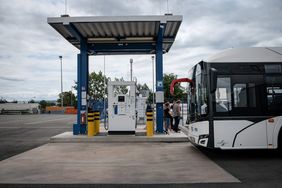Published: 19 November 2025
Power Transition: Nationwide Survey Shows Trent Towards Alternative Energy Solutions in Heavy-Duty Transport
Transport and logistics companies are increasingly turning to alternative energy sources such as electricity and hydrogen. Alternative power systems for heavy-duty transport will dominate in the mid- to long-term – despite high investment costs and the current lack of infrastructure. These were the findings in a recent study carried out by the Bauhaus-Universität Weimar. The study was conducted as part of the h2-well Markthub«, which involved 143 companies nationwide.
»In order to reach the national and European climate targets, a major change in propulsion technologies and energy sources in the transport sector is necessary«, says Hilde Teichmann, research assistant at the Professorship of Transport System Planning at the Bauhaus-Universität Weimar. In this context, more than 140 medium-sized to large transport companies nationwide with a total of over 14,000 buses and commercial vehicles were surveyed in the spring of 2025 on the opportunities and challenges of alternative propulsion systems.
»Our analysis identified a trend: Battery-powered electric propulsion will prevail wherever it makes technical and operational sense«, says Hilde Teichmann. According to predictions made by transport companies, nearly half of all vehicles will be battery-powered by 2045. The percentage will vary depending on the industry and vehicle category. Synthetic fuels (e-fuels) and hydrogen come in second and third place among the preferred alternative energy sources.
»Already today, 50% of transport companies and 47% of transport operators are considering vehicles with alternative propulsion systems when it comes to new purchases«, noted the transport scientist. Looking ahead to 2030, over 60% of companies plan to use battery-powered electric vehicles, and 20 to 40% of companies plan to use hydrogen-powered vehicles.
Whether in coaches, public bus transport, or the construction and waste disposal sectors: Hydrogen drives are considered especially promising for long-distance travel and heavy commercial and special-purpose vehicles. Businesses expect that by 2045, 30% of all coaches and special-purpose vehicles will be hydrogen-powered. Hydrogen-powered public buses and trucks over 12 tonnes are expected to make up 10 - 20% of the fleet.
At the same time, this transition to new propulsion systems is posing major challenges for German transport and logistics companies. According to the study, high investment costs, a lack of infrastructure, insufficient green hydrogen production, and an unclear subsidy policy are considered the biggest obstacles to the introduction of zero-emission vehicles. Reluctance is particularly high in the commercial vehicle sector (logistics, construction, and waste disposal industries): 65% of the transport companies asked rated the transition to alternative propulsion systems in their operations as being of little to no significance – securing skilled workers, digitalization, and the business situation are rated as having a much higher priority.
Further information can be found on the European Digital Innovation Hub Thuringia website:https://edih.digital/mod/page/view.php?id=1873&forceview=1
Contact:
Hilde Teichmann
Professorship of Transport System Planning
Phone: (+49) 03643 / 58 4464
E-Mail: hilde.marie.teichmann[at]uni-weimar.de
Kontakt
Bauhaus-Universität Weimar
Claudia Weinreich
Pressesprecherin
Tel.: +49(0)3643/58 11 73
Luise Ziegler
Mitarbeiterin Medienarbeit
Tel.: +49(0)3643/58 11 80
Fax: +49(0)3643/58 11 72
E-Mail: presse[at]uni-weimar.de
Web: www.uni-weimar.de/medienservice


